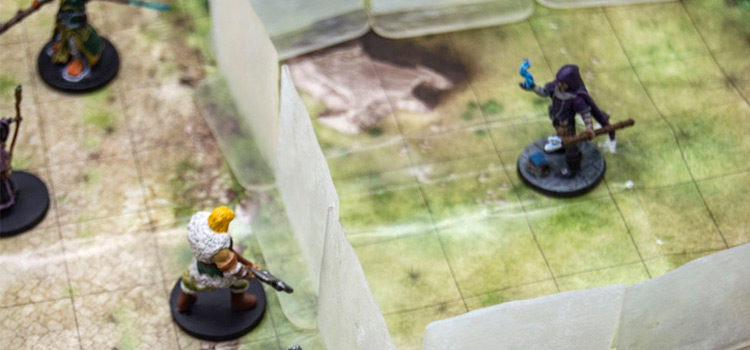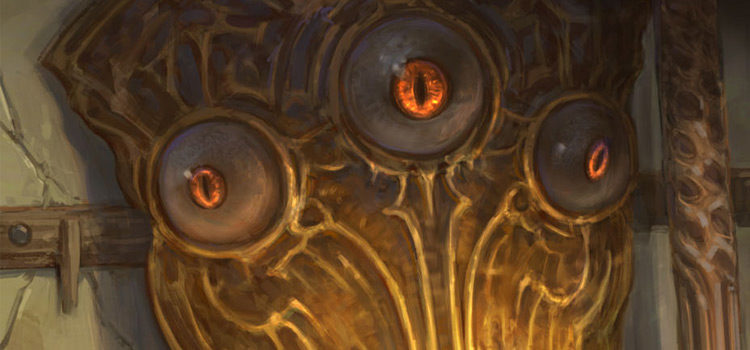Nondetection: D&D 5e Spell Guide
This post may contain affiliate links. If you buy something we may get a small commission at no extra cost to you. (Learn more).
Some spells in D&D shine most outside of combat, rather than in the midst of battle.
Let’s take a look at one of these useful utility spells and check out some use cases for nondetection.
Nondetection
Type: 3rd Level Abjuration
Casting Time: One Action
Range: Touch
Components: V, S, M (25 gp worth of diamond dust, which the spell consumes)
Duration: Eight Hours
For a full eight hours, anything with nondetection cast on it is hidden from divination magic. You can cast the spell on a willing creature, or on an object or area.
If casting it on an object or area, the target has to fit inside a 10 foot cube.
While affected by the spell, the creature, object, or area can’t be targeted by divination magic or seen by scrying sensors.
Who Gets It?
Nondetection is on the spell lists for the bard, ranger, and wizard. Knowledge Domain clerics have it as a domain spell, and for them it is always prepared.
Deep gnomes can get it as a free spell to cast on themselves at will through the Svirfneblin Magic feat.
Half-elven spellcasters in Eberron can get it from the Mark of Detection. These variant half-elves get nondetection added to their class’ spell list (if they have one).
Any spellcaster in the Ravnica setting can get it by being a part of the Dimir Guild. Guild members who have the Dimir Operative background get a number of spells added to their class’ spell list, including nondetection.
Spell Drawbacks
Having nondetection on you is helpful.
But it prevents you from using any divination spells on yourself.
Detect magic, detect evil and good, see invisibility, and several more divination spells target the person casting them.
Nondetection blocks divination spells from targeting you, so it wouldn’t have any effect.
It also blocks convenient spells like telepathic bond. Since the spell is divination magic, you can’t be included in the telepathic conference call established by the spell.
This is unfortunate, and somewhat nonsensical.
While telepathic bond is divination, the higher-level telepathy spell is evocation, and one would hope for some consistency in how you use magic for telepathy.
Nondetection Costs
Unfortunately, the cost of the nondetection spell adds up over time.
If you think you’ll need to cast nondetection on multiple people every day, I recommend looking for an amulet of proof against detection and location.
It’s a mouthful, but the amulet reproduces the effect of the nondetection spell.
It also doesn’t require constant spell slots or funds to use.
These amulets are uncommon items. While not cheap, they’re relatively inexpensive as magic items go.
If your group is using the crafting rules from Xanathar’s Guide to Everything, you can try to make them yourself. Each amulet of proof against detection and location costs 200 gp to make and takes 2 workweeks to enchant.
You could run into complications making them, or need to harvest a unique component for the crafting.
But ultimately it’ll be cheaper than casting nondetection 3 times a day.
Nondetection: Uses, Tips & Tricks
Nondetection has some unique use casess, depending on who’s using the spell.
One of the obvious situations where nondetection comes in handy is when trying to hide from an enemy spellcaster who can cast scrying.
It’s awful having your party constantly spied upon by an evil lich or a malevolent hag. And the nondetection spell can keep them from seeing your party.
Combat Tactics
Nondetection is mostly useful off the battlefield. That said, it has some uses as a defensive spell.
A creature can use nondetection to make itself immune to a ranger’s hunter’s mark spell. It also works as a defense against the mind spike spell. This can come in handy if you happen to be fighting an enemy that makes frequent use of those spells.
Depending on the DM, nondetection might also work to make you immune to some of the effects of an enemy’s foresight spell.
While it wouldn’t block most of the spell, it might cancel out any disadvantage on your attack rolls against the creature with foresight on it.
Enemy Tactics
For DMs, nondetection has some fun uses for enemy NPCs.
Nondetection can make creatures immune to spells players are fond of, especially detect magic.
Here are some examples:
- Hiding a magical disguise (alter self, disguise self, polymorph) from someone using detect magic
- Hiding a monster that would be detected by the detect good and evil spell
- Allowing a fiend to masquerade as a humanoid (immune to detect good and evil and detect magic)
- Hiding a powerful poison from magical detection (detect poison and disease)
- Make a magical item seem nonmagical to identify
- Hiding a creature’s thoughts from a detect thoughts spell
- Hiding an object or creature from any number of spells (locate object, locate creature, scrying)
Since nondetection blocks divination magic, any spellcasting enemies that the party encounters might make use of the spell if they have access to it.
Where It Gets Tricky
This comes down to what counts as divination magic.
To be clear, the spell says ‘divination magic’ rather than ‘divination spells’.
This matters mostly in corner cases.
If you ran across a magical scanning device powered by divination magic, anything with nondetection on it wouldn’t show up on the scan.
Some magic items aren’t that specific.
If they are, they usually reproduce the effect of a divination spell, so in many cases, it’s a non-issue.
True Seeing vs. Truesight
One divination spell in 5th edition is true seeing.
This spell grants a creature truesight, which allows them to see into the Ethereal plane, see in darkness, see through illusions, and has various other features.
However, there’s a distinction between something that has truesight from true seeing or a creature that has innate truesight.
True seeing is a divination spell. Ao if a creature has nondetection cast on it, that creature is immune to the truesight granted by a spell.
A creature with innate truesight would be unaffected.
This leads to a number of other corner cases with the nondetection spell. The short version is that if an effect isn’t caused by a spell, nondetection doesn’t affect it.
This includes effects like the paladin’s Divine Sense ability. Divine Sense isn’t a divination spell, so it isn’t necessarily blocked by nondetection.
A DM can rule otherwise, and it does make a kind of sense that an ability like Divine Sense might count as divination magic. Officially, however, nondetection doesn’t work on effects that aren’t explicitly divination.
Talking To Gods & Otherworldly Entities
Certain spells use divination magic to ask a god or powerful entity a question. Augury, divination, commune, and contact other plane all ask an external entity for information or advice.
Does nondetection hide something from those spells as well?
It depends on the DM.
When you cast augury, you’re asking a god (or other entity) if a course of action will go well or poorly for you. You’re not trying to detect or locate something, you’re asking about your personal future.
The “otherworldly entity” that augury contacts knows whatever it happens to know. Same for a god you call up with commune or the extraplanar demigod you talk to with contact other plane.
The general ruling is that nondetection doesn’t stop you from gaining information about something when you ask an external source.
This spell gets compared to the more powerful mind blank spell, which explicitly foils high-level spells and effects used to gain information about a target.
On the other hand, commune with nature grants a spellcaster knowledge of the surrounding territory. The spell doesn’t ask a nearby tree if it saw someone. No, it senses powerful extra planar entities, buildings, prevalent creatures, and other details about the area.
Since the spell is directly trying to discover information about an area, the general ruling is that nondetection would make you immune to the spell.
What Counts as Targeting?
There are two arguments about nondetection, focusing on the wording of the spell.
One line of the spell says that “the target can’t be targeted by any divination magic.”
Some people interpret that line to mean that nondetection only prevents you from being targeted by divination spells that target you specifically.
Why is this an issue?
A number of divination spells only target the person casting them.
By this interpretation, you wouldn’t be able to cast detect magic on yourself. But someone else using detect magic would see a magical aura around you from the nondetection spell.
The other interpretation focuses more on the first line of the spell: “you hide a target that you touch from divination magic.” This interpretation would mean you can’t cast divination spells on yourself, and you don’t register to other people’s divination spells they cast on themselves.
According to the game’s designers, the second interpretation is the correct one.
In a conversation on twitter, Jeremy Crawford stated that nondetection would make you immune to the see invisibility spell.
This is important because see invisibility is another one of those spells that targets the person casting the spell.
Like detect magic, it targets the caster, not the object or person you are trying to see magical auras around.
In short, the designers’ intention was that nondetection means divination magic can’t see you.






